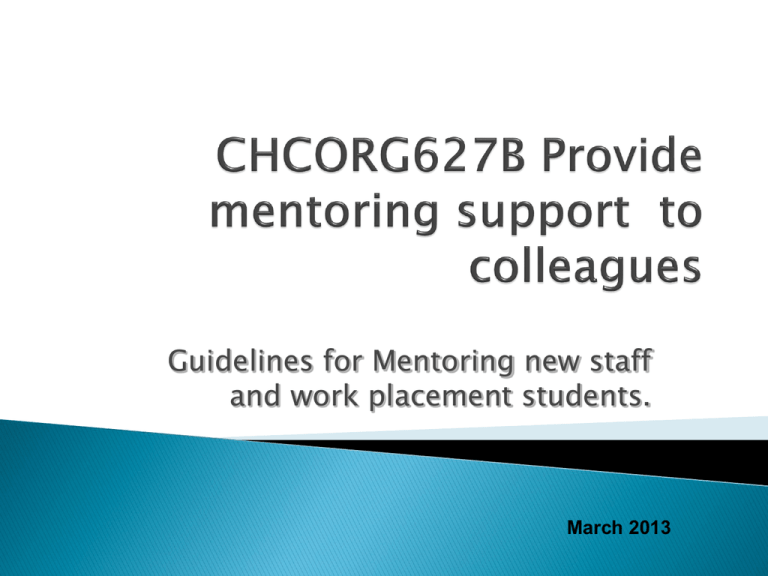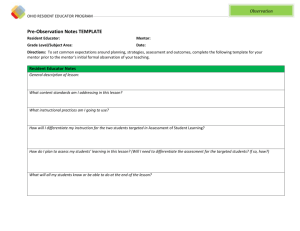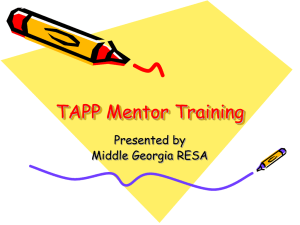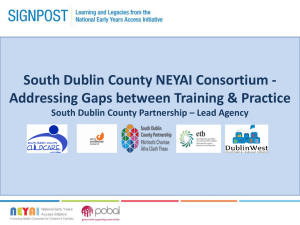Lesson Presentation
advertisement

Guidelines for Mentoring new staff and work placement students. March 2013 What is a ‘mentor’ What is expected of a ‘mentor’ Qualities needed to be a ‘mentor’ What is the purpose of mentoring others? What can and can’t a student do on work placement? What support does a new employee need? Adult learning principles? Communication skills Active listening How to give constructive feedback to a student or a new trainee Conflict resolution Group scenarios of ‘what if…’ situations common to new employees and students on placement and discussion of how to handle these Ideas for helping new staff to fit in and want to stay in the organisation A Mentor is a staff member nominated by the facility to provide guidance & support to a new staff member or student. Assessment Activity 1 Remember back to your first day in nursing. Discuss your experience with the person next to you. List 5 good things about your first day and 5 bad things about your first day Provide educational support to meet learning objectives & assist in relating theory to practice. Create a positive, non-threatening learning environment. Encourage new staff member or student to develop safe, organised processes. Provide regular constructive feedback. Identify learning opportunities & organise accordingly. Liaise with student’s facilitator. A person who inspires and serves as a role model. To support the professional growth & development of the new employee or student. To encourage the new employee or student to develop safe and correct ways to perform tasks. To be a resource person for the student or new employee. To develop trust confidence and rapport Director of Nursing, Facility Educator New Staff or Students Mentors TAFE Facilitators Unit Managers Director of Nursing, Facility Educator and TAFE Facilitator– ensure policies and procedures are in place to provide adequate preparation and supervision of students. TAFE Facilitator- will visit the student during work placement time Unit Managers – implement procedures ensuring students are placed with suitable “buddy”. Buddy – Students – provide guidance and supervision to student to ensure safe work practices and appropriate care is being given to residents in accordance with facility policies, procedures and philosophies. adhere to the facility’s goals, objectives, policies and procedures. Co-operate in the spirit of mutual understanding and respect with other members of the staff. Think back to your first weeks at work… What qualities did the person have who was a ‘good’ mentor? What qualities did the person have who was a ‘bad’ mentor? Effective communicator. Time management skills. Organised, tidy worker. Contented employee. Respectful to ALL residents and other staff members. Familiar with all policies & procedures. Sense of humour Supportive listener Effective questioner Able to provide constructive feedback Present a positive attitude Introduce new employee or student to your colleagues. Take new employee or student to meal breaks with you. Encourage them to ask questions. Encourage them to challenge their limitations. Respond to non verbal communication. REMEMBER: New employees or students are like sponges and will pick up on your attitudes. You don’t get a second chance to make good first time impressions. Provide educational support to meet learning objectives & assist in relating theory to practice. Create a positive, non-threatening learning environment. Encourage new staff member or student to develop safe, organised processes. Provide regular constructive feedback. Identify learning opportunities & organise accordingly. Liaise with the Educator or Manager or student’s facilitator. Prior to work experience students have had the opportunity to practice all personal care skills in a simulated environment. Students are expected to be capable of performing hygiene needs to the residents, firstly under the guidance of you the mentor. Students should be encouraged & expected to do all activities of daily living as they learn them. It is our hope students will willingly participate in these activities with enthusiasm and some skill. Personal Care. Bed making. Feeding a dependent resident. Correct body positioning. Resident transfer. Use of mobility aids. Hearing aid and spectacles care. Complete all work experience. Be punctual and professional. Attend handover & take notes. Complete clinical competencies & be assessed by TAFE facilitator. Complete daily journal and portfolio. Ensure they have been assessed in all required tasks. What do I do if person is unsafe? Do not leave student with a resident alone, speak to your Registered Nurse immediately. Who is responsible for the resident when new staff member/student are providing care? The Registered Nurse on duty. What do I do if I have concerns about the persons performance? Speak to Clinical Facilitator (TAFE) & RN on duty. Are the students insured? Students are covered for personal accident insurance through TAFE. * Use clear & appropriate language. * Watch for non-verbal cues eg: facial expression, body language. * Never assume & be sensitive to individual differences. * Choose appropriate time & environment. * Answer all questions to the best of your knowledge. BEHAVIOUR……When you……….…. FEELINGS……….I feel……………….. EFFECT………….Because…………… The 3 steps to an “Assertive Message” in response to what you see as unacceptable or exceptional behaviour. Report accurately & objectively. Describe what actually happened. Avoid character assassinations and swearing. Avoid absolutes such as “never”, “always”. Concentrate on one behaviour at a time. Ensure you assert about the “actual issue/behaviour”& to the right person. Posture: maintain an open position with arms & legs, stand directly in front. Eye Contact: Look into their eyes with an occasional glance away. Facial Expression: To coincide with your message, avoid smiling or nervous laughter. Gestures: Be natural, avoid pointing and fidgeting. Voice: Remain calm and firm. Lungs: Lots of air…. Breathe at steady rate. There are four primary skills vital for good verbal communication & needed in the processes of negotiation and mediation: Listening. Questioning. Making “I” statements. Giving and receiving feedback. Active listening: ◦ do not make judgements as they speak ◦ do not butt in with own story ◦ do not think of response and wander off with thought processes. Reflective listening: ◦ ◦ ◦ ◦ ◦ paraphrase what is being said check your interpretations with the speaker ask questions acknowledge their feelings refrain from judging. Point out the positive aspects of the task the task student has performed & you are providing feedback on. Be precise, clear and gentle in judgement. Discuss issues about task student has been unable to complete, giving suggestions on how they could improve. Finish on a positive note or comment. PREPARATION: Ensure you have dealt with your emotions, and released any frustration. Discuss in private. DELIVER MESSAGE: concentrate on the behaviour not the person. STOP & LISTEN- Assess response. REFLECTIVE LISTENING- Repeat message back to them. REQUEST BEHAVIOUR YOU WANT. COMMUNICATE CONSEQUENCES. 1. Give information, not interpretation. Describe what you see, hear or feel rather than judging or giving opinion. Consider the difference: ‘You looked away when I was speaking to you then, and it seemed you were not listening’. OR ‘You’re not paying attention to what I am saying’. Why does conflict arise? What influences my response to conflict? Constructive & destructive conflict. Factors contributing to ongoing conflict. Conflict outcomes include: The win/win, win/lose, lose/lose, lose/win What is your understanding of “The reasons behind conflict?” Being misunderstood Angry people Needs unmet Unexpressed emotion Regardless of the setting there are three main causes of conflict. Mistakes and Accidents Misunderstood communication The impact of judgements made about others. In any conflict there are emotional factors & the chance that some conflicts will not be satisfactorily resolved. DESTRUCTIVE CONFLICT usually produces: Anxiety Withdrawal Non-cooperaton Confusion Excessive conflict (public screaming matches, physical violence) Enemies Resentment Physical illness CONSTRUCTIVE CONFLICT produces positive effects: Efficiency Openness Growth A sense of achievement Common purpose Strengthened relationships Determine the roles in a conflict: One of the first difficulties when addressing a conflict situation is in determining WHO are the stakeholders? PRIMARY Stakeholders are those who are involved with the conflict & often the source. SECONDARY Stakeholders are affected by the conflict, and the outcome of the conflict, but not the source. In simple conflict situations the primary stakeholders resolve the conflict. In some situations the Secondary stakeholders may become embroiled in conflicts of their own, requiring a third party to address them. Two means of addressing conflict involve: (1) Informal: Some times conflict is resolved spontaneously, over a cup of coffee, talking through issues. (2) Formal: This may include arbitration meetings with an agenda, support people to run proceedings and an appointed mediator. Win-win Creative response Empathy Assertiveness Co-operative power Managing emotions Willingness to resolve Mapping the conflict Designing options Negotiation Mediation Broadening perspectives Assist the person to identify and evaluate options to achieve agreed goals Share personal experiences and knowledge with the person to assist in progress to meet agreed goals Encourage the person to make decisions and take responsibility for courses of action or solutions under consideration Provide supportive advice and assistance in a manner that allows person to retain responsibility for achievement of their own goals Recognise and openly discuss changes in the mentoring relationship Make adjustments to the relationship to take account of the needs of both mentor and person being mentored You have been buddied with a student who keeps disappearing off the floor to have a smoke. The student says to you ‘you should be using a lifter for that transfer’ That’s what we were taught. You hear the student being rude to the resident because they have been incontinent. The student keeps rushing ahead of you and is making mistakes in what needs doing. The student shows no initiative at all- they will do what you ask and then just stand there. The student is helping you with a bed bath and keeps talking to you over the resident, ignoring their presence. The new employee has their phone turned on and it keeps ringing. The other staff members have decided the new employee is ‘hopeless’ and make it clear to them how they feel. The new employee is taking much too long with each resident as they are sitting down having a chat with them. How much ‘mentoring’ do you think a new staff member needs? What systems are in place in your facility to support new staff? How do you think the process for orientating new staff could be improved? Would it help to meet with other ‘buddies’ occasionally to discuss experiences and suggest improvement to systems? After the initial orientation period how long should you support a new staff member? Suggest ways you can provide ongoing support to the new employee Can you help to change the culture of your facility if needed? How would you change it to make new employees fit in and become competent Write down what you think are the 3 most important things you have learnt in this workshop








